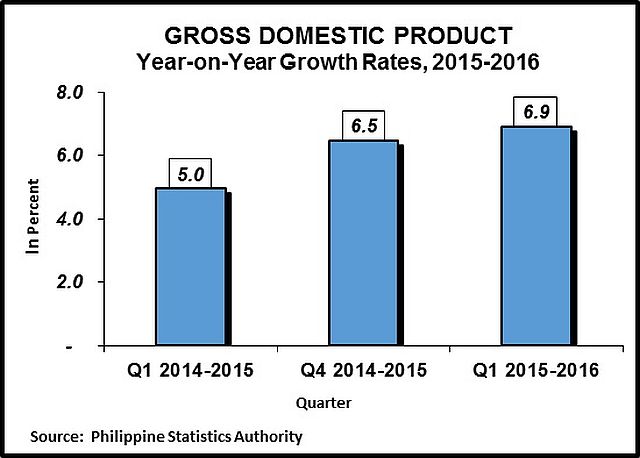
With a 6.9% growth in the first quarter, the Philippines is the fastest-growing economy in Asia, followed by China (6.7%), Vietnam (5.5%), Indonesia (4.9%), and Malaysia (4.2%).
The Aquino government is set to turn over a “strong and stable” economy to the next administration, with the gross domestic product (GDP) expanding by 6.9 percent in the first quarter of this year.
Socioeconomic Planning Secretary Emmanuel F. Esguerra said the 6.9-percent growth, which was above the market expectation of 6.6 percent, made the Philippines the fastest growing economy among 11 Asian countries that have released their growth data for the quarter.
“This robust performance of the economy increases the likelihood of achieving the official GDP growth projection of 6.8 to 7.8 percent for full-year 2016, despite the weak agriculture and fishery sector,” Esguerra said in a statement. The 6.9-percent growth is a huge improvement from the 5-percent growth in the same period last year.
Esguerra, who is also the National Economic and Development Authority (Neda) director-general, said the 6.9-percent growth in the first quarter followed the high-growth path of the country’s economy.
“We are pleased to be turning over a strong and stable economy onto the next administration. We have achieved significant socioeconomic progress over the last five years with the return of political and economic stability, which we hope the incoming administration will build on. We should not miss the current second wave of foreign investments into the region, especially now that we have finally become an investment destination of choice,” he said.
Business leaders in Cebu welcomed the strong first-quarter economic results and hoped the incoming administration would be able to sustain the growth.
Melanie C. Ng, president of the Cebu Chamber of Commerce and Industry (CCCI), said growth would be sustained if the eight-point economic agenda announced by the camp of presumptive President-elect Rodrigo Duterte would be followed and complemented with clear and specific programs.
“The new administration needs to have a strategic and cohesive economic plan in place so as to sustain the high growth trajectory that we currently have. There is a need to continue to win investor confidence while, at the same time, fix the internal problems we have in the country,” she said.
“There is a need to strike a balance so that the economy will come out the winner and we, Filipinos, the winners,” Ng added.
Philexport Cebu chairman Apolinar “Allan” Suarez Jr. said he was optimistic despite the different equations this time.
“Everyone hopes his (Duterte) economic team will be the right people to move us to higher trajectory,” he said.
Sabino R. Dapat, chairman of the European Chamber of Commerce of the Philippines (ECCP) Cebu Business Council, has adopted a wait-and-see attitude.
“It all depends on the policies that the new administration will follow,” he said.
Mandaue Chamber of Commerce and Industry (MCCI) past president Philip N. Tan, for his part, was hopeful that the new administration would further improve the country’s economy.
“Let us all give him (Duterte) the support for the sake of our country,” he urged.
Based on the PSA report, GDP growth was driven mainly by the services sector which accelerated to 7.9 percent from 5.5 percent.
Industry grew by 8.7 percent from 5.3 percent posted last year while the agriculture sector contracted by 4.4 percent, the fourth consecutive quarterly decline since the second quarter of 2015, from a growth of 1.0 percent in the first quarter of 2015. Overall, Esguerra said growth prospects were encouraging.
“Growth in the second quarter of an election year is usually stronger than in the first quarter. Barring a significant drop in business confidence in the second half, the economy seems to be on track in meeting the full-year target of 6.8 to 7.8 percent,” he said.
But he warned that the agriculture and fishery sector will continue to reel from the lingering impacts of El Niño. The country should also start preparing for the La Niña.